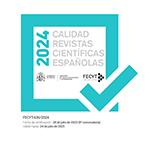Introduire l’expérience mystique dans les notions de la politique
Resumen
Frente a la oposición del bien y del mal según métodos irreligiosos o idolátricos, Weil propone otro método, la mística. La experiencia mística provoca una transposición a un nivel superior de lo que piensa el filósofo, especialmente en el ámbito político. Este artículo pretende, por tanto, refutar las formas erróneas en que se cierra la cuestión de la relación entre mística y política.
El camino recorrido por la filósofa en su análisis de la literatura ayuda a comprender su posición en el campo político, pero el análisis de la "espiritualidad específica" de la guerra revela la dificultad de pensar la relación entre lo espiritual y la acción.
La salida a la dificultad encontrada es pasar, "a fuerza de arte", al lado de la "verdadera relación" entre el reino de la necesidad y una inextinguible aspiración al Bien. Del lado de la acción, el "Proyecto de formación de enfermeras de primera línea" debería ser reexaminado. En el lado literario, Venecia Salvada ilustra este esfuerzo por manifestar una verdad que es tarea del poeta presentar.
Descargas
Descarga artículo
Licencia
La revista Logos. Anales del Seminario de Metafísica, para fomentar el intercambio global del conocimiento, facilita el acceso sin restricciones a sus contenidos desde el momento de su publicación en la presente edición electrónica, y por eso es una revista de acceso abierto. Los originales publicados en esta revista son propiedad de la Universidad Complutense de Madrid y es obligatorio citar su procedencia en cualquier reproducción total o parcial. Todos los contenidos se distribuyen bajo una licencia de uso y distribución Creative Commons Reconocimiento 4.0 (CC BY 4.0). Esta circunstancia ha de hacerse constar expresamente de esta forma cuando sea necesario. Puede consultar la versión informativa y el texto legal de la licencia.











